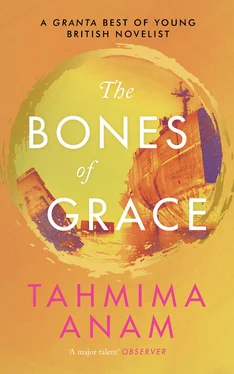We got up and started clearing up the last bits of your packing when it happened. I had wrapped the plastic bottle of honey in a bag and sealed it with tape, and I was leaning over your bag and slipping the honey into the side pocket when we heard a knock on the door. Mo went to answer it, and there, on the other side of the threshold, was Rashid.
He did not appear surprised. He walked right up to you and shook your hand, as if he had expected to happen upon his wife packing another man’s suitcase. I felt my legs giving way under me, so I walked over to the window and leaned against the wall and watched the two of you introducing yourselves. ‘I’m Elijah,’ you said, your face lacking a single shred of remorse, and Rashid said, ‘You must be a friend of Zubaida.’ He may have even have said something like ‘Welcome to Bangladesh’, though I can’t recall the exact words because a roaring began in my ears and I was afraid if I opened my mouth I might have to shout in order to drown it out.
I try and think of how a better person would have reacted. A better person would have taken the moment as an opportunity to bring everything out in the open — after all, if I had really meant what I’d said, if I was really going to leave Rashid, what better time than now? A better person would have told the whole story, in calm, unambiguous terms. A better person would have marked out her loyalties — not only to you, the man I was now in love with, but also to herself. But I was not that person, not even in the better light of your presence.
The only sign that Rashid had noticed anything at all was in the slight force of his breath and the way he was lifting up various things and putting them down again, like the jar of pickles on the dining table or the camera Gabriela had left on the bookshelf. I finally found my tongue and stammered something about you coming to visit. You were waiting, I know, for me to say something truthful to Rashid, but I knew from the moment I saw him that I would not. He knew it too. We stood around awkwardly while you both waited for me to act, to set the terms for the conversation we were about to have. I was still holding the bottle of honey, and I walked over to you, Elijah, and placed it in your outstretched hand. ‘Don’t forget this,’ I said. And then I asked Rashid about China, and Rashid said it was a good trip, that it had ended early, that the car was waiting downstairs and if I was ready we could leave straight away. ‘The traffic gets bad in the evenings,’ he said to you, as if you too were planning to drive to the other side of town and spend the night in a frangipani-scented villa on the side of a hill.
‘I met Elijah at Harvard,’ I said to no one in particular.
‘Yes, I assumed that,’ I heard Rashid reply, though my eyes were on you, your back bent over the suitcase, your posture so terribly, terribly sad. It was starting to dawn on you now that I was not going to tell Rashid anything, that I was going to go home and leave you there at the apartment. I noticed Mo hanging around and I was afraid he would say something to give us away, so, with a wave of my hand, I motioned for him to leave the room. It was the sort of shooing gesture I had often seen Dolly make to her servants, and to this day, of all the things I am ashamed of, my gesture to him in that instant is what I regret the most.
You went into the kitchen and I heard you talking to Mo. Then you both came out and shook hands with each other. Rashid and I stood and watched. You slipped a folded-up note into the front pocket of Mo’s shirt. He wrapped his arms around your waist and you had to peel him off. We heard his bare feet on the steps, the movements of a wounded animal.
‘You can collect your things later,’ Rashid said, and I nodded mutely, and turned towards the door and walked through.
And as we parted, Elijah, right there in front of my husband, do you know what I was thinking? Not that I would regret, the moment I left the apartment, the way I trashed everything that had passed between us in the last weeks, not my treatment of Mo, not abandoning you without even a proper goodbye, not the bland expression I gave you as the last image of my face, not the way I allowed Rashid to circle my waist with his arm — no, none of that. All I could think about, as we descended the stairs and stepped into the air-conditioned car, was that if only Rashid had arrived a few hours later, I could have spared him the sight of me gazing at you as if I had just been born, and everything could have gone back to the way it was, and I would have had nothing to explain, no story to tell, no guilt weighing me down like stones around my ankles.
Anna said to Vronsky: Don’t you understand that from the day I loved you everything has changed for me? It did for me, too, Elijah. But not enough. Everything did not change enough, not enough for me to have the courage to tell the truth in the moment that the truth demanded, not enough for me to stand by you and leave behind all the unanswered questions of my life. Too much remained the same. Don’t read this and forgive me — I know you won’t — don’t forgive me yet. There is so much more to the story, you will see; for now, I will only tell you this: I wanted desperately to be the person who would upend everything and thrust myself into the unknown, but the future was not the only thing that was unknown to me, and because I was already unmoored, I could not cut the threads that held me in place. Not yet.
In the days that followed, I was a puppet. He instructed me to eat chicken soup, so I did. Told me I should stop taking walks around the estate with Joshim because the daytime mosquitoes might give me dengue fever, so I spent the mornings inside. He drove us to Patenga, where we dipped our feet in the sea and listened to the sound of gulls and peanut shells cracking beneath our feet. He was patient, solicitous, as if he had found me in the throes of a terrible illness. But at night he kept to his side of the bed and never touched me, not even the barest graze of his knuckle against my skin.
I couldn’t sleep. My body was cold and I caught a whiff of you in the crook of my elbow, as if my arm had brushed a dark and very private part of you. I didn’t shower, afraid the smell would disappear. I lay awake at night, trying to cover over the wound, and every morning, as the day hit my eyes, it would open up like a flower as I remembered everything, the way the light poured through the windows and pooled around our feet that afternoon, and the grate in my voice as I dismissed Mo, and the streaks of dark in the cement of the stairs as I climbed down, because my head had been bowed and I had concentrated on nothing except putting one foot in front of the other.
At the end of the week, we returned to Dhaka. I couldn’t face the beach, or Gabriela. I called Bilal and told him I was sick, that I needed a few weeks off. ‘Is it typhoid?’ he asked. ‘There’s been something in the water in Sithakunda.’ ‘No, it isn’t typhoid,’ I said, wishing it was something measurable like that, something that could be treated with drugs. Maybe I’ll go to Nadeem and ask for some pills. Of course I knew I wouldn’t. There was no point in seeking oblivion now.
In Dhaka, it was my mother’s birthday. My parents came to dinner and we sat around the table while Rashid and his father told us about China, marvelling at the height of the Shanghai skyline and the fact that the electricity never went out. My father was animated by this conversation; as an old leftist, he had a lingering fondness for the Chinese. Everyone was jolly, even Ammoo, though I knew she had recently returned from another trip to visit the rape victims in Sirajganj. When the cook brought out a cake to celebrate Ammoo’s birthday, I realised I’d forgotten to buy her a present and was about to apologise; but Rashid came out with a grey velvet box, inside of which was a necklace of milky pearls. ‘This is wonderful,’ Ammoo said, her eyes shining and wet, ‘this is unimaginable happiness.’
Читать дальше












